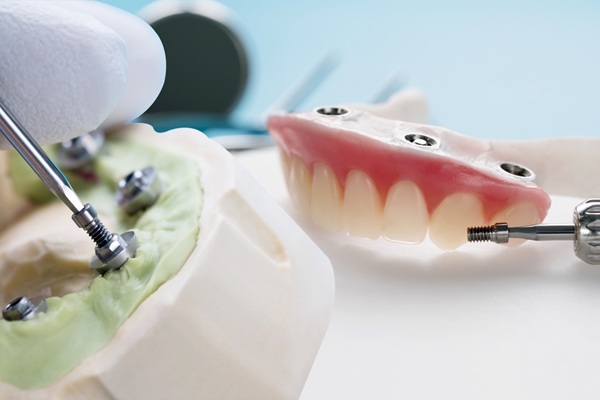Tooth Replacement 101: A Guide to Implant-Supported Dentures

Tooth loss affects appearance and the ability to chew, speak, and smile with confidence. Fortunately, implant-supported dentures can replace multiple teeth with a natural look and feel. This advanced tooth replacement is also known for its durability, stability, and ability to prevent jawbone loss. A general dentist trained in implant dentistry can help patients understand their options and guide them through each step of the process.
Replacing teeth with implant-supported dentures
Unlike traditional dentures that rest on the gums and rely on adhesive for support, implant-supported dentures are anchored to the jawbone using dental implants. These small titanium posts replace tooth roots to create a solid foundation for the denture arch. A permanent denture is then attached via connecting pieces (abutments) for improved comfort and functionality over traditional dentures.
In many cases, a full arch can be supported with just four to six implants. This allows the general dentist to restore an entire row of teeth with fewer surgical placements than traditional dental implant methods would require. The implants also help preserve bone density, reduce irritation to the gum tissue, and eliminate concerns about slippage during eating or speaking.
How long is the process?
The full process for implant-supported dentures varies depending on the patient’s oral health and whether any qualifying procedures are needed. Tooth extractions and bone grafting are common examples. For reference, here is the general timeline for most patients:
- Initial consultation and imaging to assess bone density and treatment goals
- Implant placement surgery, followed by a healing period of three to six months to allow the implants to fuse with the jawbone
- Attachment of abutments and impressions for the final prosthetic
- Placement of the permanent denture, completing the implant-supported dentures
A general dentist oversees each stage of the process, ensuring proper integration of the implants and optimal fit of the final restoration. The full timeline may span several months. However, since the implants become part of the jawbone, the final result feels, looks, and functions like real teeth.
Who is a good candidate?
Most healthy adults with missing teeth can qualify for implant-supported dentures, although general dentists look for several factors to determine candidacy. The jawbone, for example, must be strong enough to support the implants. If the patient has experienced jawbone loss or shrinkage, they may need bone grafting to create a stable foundation for the implants. Good oral hygiene habits and overall health also play an important role in treatment success.
A dentist will review medical history, medications, and lifestyle factors such as smoking, which can affect healing and implant success. Patients with chronic health conditions like uncontrolled diabetes or autoimmune disorders may need additional medical clearance before moving forward. For qualified candidates, implant-supported dentures offer a significant upgrade in comfort, function, and long-term stability.
Find out more in an appointment
Choosing implant-supported dentures is a big decision, but professional guidance helps make sure the process goes smoothly from start to finish. The team at Dental Element can answer questions, evaluate oral health, and offer a customized plan that fits your or your loved one’s needs and goals. Schedule an appointment at our Philadelphia office today.
Request an appointment here: https://www.dentalelement.com or call Dental Element at (215) 383-1575 for an appointment in our Philadelphia office.
Check out what others are saying about our dental services on Yelp: Implant Supported Dentures in Philadelphia, PA.
Related Posts
When someone is experiencing TMJ pain, their priority would be getting relief, which a headache dentist specializes in. In this article, you will learn about Temporomandibular Joint Disorder (TMJ), the symptoms, and how a headache dentist can help provide substantial relief to TMJ pain.The temporomandibular joint is a joint linking the lower jaw to the…
Approximately 25 million adults in the United States experience obstructive sleep apnea. This sleep disorder can go unnoticed until the symptoms become debilitating. Not knowing about the disease is one of the main reasons people do not receive adequate treatment.Obstructive sleep apnea is a chronic sleep disorder that occurs when the upper airway becomes blocked…
Your cosmetic dentist can use dental bonding to restore your smile. This is a simple and easy procedure that you can have in one appointment. Knowing how this treatment helps will allow you to appreciate its effects more. Here are the details about how a cosmetic dentist uses dental bonding.Dental bonding has many uses. A…
Regular visits to the dentist are a must when it comes to maintaining good oral health. But, if you are looking for dental treatment to enhance your smile's appearance, a cosmetic dentist may be the way to go. A cosmetic dentist is a dental professional who specializes in improving the aesthetics of teeth and gums.…
